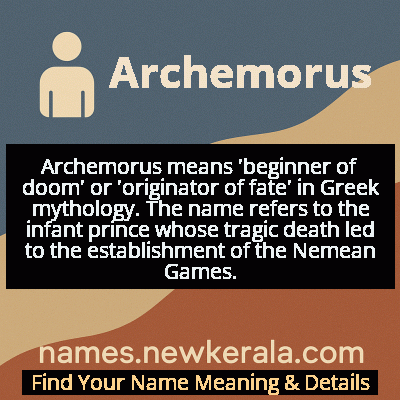Archemorus Name Meaning & Details
Origin, Popularity, Numerology Analysis & Name Meaning of Archemorus
Discover the origin, meaning, and cultural significance of the name ARCHEMORUS. Delve into its historical roots and explore the lasting impact it has had on communities and traditions.
Name
Archemorus
Gender
Male
Origin
Greek
Lucky Number
4
Meaning of the Name - Archemorus
Archemorus means 'beginner of doom' or 'originator of fate' in Greek mythology. The name refers to the infant prince whose tragic death led to the establishment of the Nemean Games.
Archemorus - Complete Numerology Analysis
Your Numerology Number
Based on Pythagorean Numerology System
Ruling Planet
Uranus (Rahu)
Positive Nature
Strong sense of order, loyal, practical, and disciplined.
Negative Traits
Stubborn, overly serious, rigid, and prone to feeling restricted.
Lucky Colours
Blue, gray.
Lucky Days
Saturday.
Lucky Stones
Blue sapphire.
Harmony Numbers
1, 7, 8.
Best Suited Professions
Managers, engineers, accountants, organizers.
What People Like About You
Dependability, discipline, practicality.
Famous People Named Archemorus
Archemorus of Nemea
Mythological Figure
Infant prince whose death led to establishment of Nemean Games
Archemorus Lycurgus
Literary Character
Pivotal character in Statius' epic 'Thebaid'
Archemorus The Prophet
Mythological Seer
Oracular figure whose death served as important omen
Name Variations & International Equivalents
Click on blue names to explore their detailed meanings. Gray names with will be available soon.
Cultural & Historical Significance
In literary tradition, particularly in Statius' 'Thebaid', Archemorus' story gains additional layers of meaning as his death serves as a powerful omen for the doomed expedition of the Seven Against Thebes. This connection positions him as a symbolic bridge between personal fate and larger historical events, embodying the Greek understanding of how individual lives intersect with cosmic patterns. The name and story continue to be studied as examples of Greek tragic sensibility, where beauty and meaning emerge from suffering, and where human institutions often have origins in unexpected, sometimes painful, beginnings that become sanctified through ritual and memory.
Extended Personality Analysis
Those bearing the name Archemorus are typically characterized by a deep, almost prophetic understanding of life's patterns and transitions. They possess an innate sensitivity to the interconnectedness of events and often serve as unwitting catalysts for significant changes in their environments. Their personality combines profound emotional depth with a quiet strength that enables them to bear burdens that might overwhelm others. There's frequently an element of tragedy or sacrifice in their life narrative, though this often leads to positive transformations for their communities or loved ones.
Archemorus individuals tend to be contemplative and philosophical, with a natural inclination toward understanding the deeper meanings behind surface events. They may display an old-soul quality, seeming to carry wisdom beyond their years or experience. While they might not actively seek leadership positions, circumstances often place them in roles where their actions have far-reaching consequences. Their presence frequently marks turning points or new beginnings, much like their mythological namesake whose death initiated the Nemean Games. They embody the paradox of being both vulnerable and powerful, personal and universal, tragic and transformative in their impact on the world around them.
Modern Usage & Popularity
In contemporary naming practices, Archemorus remains an extraordinarily rare choice, primarily confined to academic circles, mythological enthusiasts, and literary contexts. The name has never gained mainstream popularity due to its complex pronunciation, tragic mythological associations, and the general trend toward simpler, more accessible names in modern Western cultures. However, it occasionally appears in fantasy literature, historical fiction, and role-playing games where authors and players seek authentic Greek mythological names with deep symbolic meaning. Among classical scholars and mythology aficionados, the name is respected for its historical significance and the profound cultural narrative it represents. The current trend toward unique, meaningful names has led to a slight increase in its consideration among parents with strong classical education backgrounds, though it remains well outside the top thousands of baby names in any country or culture.
Symbolic & Spiritual Meanings
Archemorus symbolizes the profound truth that great cultural institutions and traditions often emerge from moments of personal tragedy and sacrifice. The name embodies the concept of being a 'first cause' or 'initial catalyst' - someone whose existence, however brief, sets in motion events of lasting significance. Symbolically, it represents the Greek understanding of moira (fate) and how individual destinies are woven into larger cosmic patterns that transcend personal experience. The serpent that caused his death carries dual symbolism of both destruction and transformation, while the subsequent establishment of athletic games represents humanity's capacity to ritualize loss and create beauty from suffering. The name serves as a metaphorical reminder that significance is not always measured by longevity but by impact, and that the most meaningful contributions to culture often come from unexpected sources whose full importance only becomes clear in retrospect.

